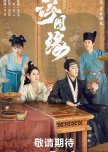Contrary to naysayers, the story is intact. Brave and noble, too.
If you're looking for a fluffy, bubble-gum drama that would not require you to think, or if you just want to see Dylan Wang's kissing scenes and are not in the least bit curious about the title of the drama, take note - only by firing up some brain cells would you fully appreciate this.
Unchained Love tells the love story of Xiao Duo, a mysterious eunuch who is the second most powerful man in the empire next only to the emperor, and Bu Yinlou, a young concubine-born noblewoman who is swindled by her father's legal wife to become one of the aged emperor's concubines. Before Yinlou meets the emperor, he dies, leaving her to become one of his childless widows who are to be sacrificed as tribute ladies to accompany him in the afterlife. Xiao Duo saves Yinlou from this cruel fate, starting a collusion between two intelligent, cunning and passionate characters that develops into friendship and eventually love.
Dylan Wang is perfectly cast as Xiao Duo, the head of an imperial bureau that enforces peace and order in the empire. Six years ago, he entered the Imperial City then used his martial arts skills and charms to gain a powerful position that would enable him to investigate the murder of his younger brother. Yuqi Chen shows exceptional acting skills as Bu Yinlou, the illegitimate daughter of a noble family who pretends to be stupid and lazy to hide her intelligence and wit, refusing to participate in palace power games.
The rest of the cast is as remarkable and three-dimensional, notably Peter Ho as the new emperor who is obsessed with Yinlou, and Zeng Li as the previous emperor's empress who is obsessed with Xiao Duo. The emperor's and ex-empress's oppressive desires to possess the objects of their obsession contrast with the unchained love between Xiao Duo and Yinlou that seeks the beloved's survival, freedom and happiness.
The title of the novel on which the drama is based, Fu Tu Ta, refers to the tower where tribute ladies are sacrificed to join newly-deceased emperors. It is thus a symbol of oppression that brought about such inhumane practices as requiring newly widowed imperial concubines to either become tribute ladies or attend to their dead husbands' remains in the Imperial Mausoleum for the rest of their lives. Another oppressive law forces male palace workers to give up their manhood, that is, become eunuchs. Oppression is also manifested in the new emperor's obsession with Yinlou and the ex-empress's obsession with Xiao Duo.
Much ado has been made about scenes that were cut due to censorship. In my opinion, only about six cut scenes had some significance but none affected the story. The absence of those steamy scenes doesn't matter as the intensity of Xiao Duo and Yinlou's passion still shines through and the remaining romantic scenes are more meaningful than the cut ones. In fact, I think the removal of some scenes served the story better. I would have been immediately turned off Yinlou had the scene of her tastelessly jumping on and kissing Xiao Duo at the start of their acquaintance not been cut.
It's rather amusing how the censored scenes provide a metaphor for Xiao Duo's manhood. Despite the cut scenes, the story is intact.
In a genre that glorifies revenge-killing, I applaud the bravery of this drama in showing how true love can rid the heart of the oppressive power of hatred that fuels the obsession for revenge. In a master stroke of storytelling, justice for his brother is served without Xiao Duo resorting to such a cowardly act as killing an unarmed man cold-bloodedly. Thus, I consider any alleged flaw, such as choppy editing due to a few censored-out scenes, more than offset by the uncharacteristic noble values espoused by this drama - love, peace, patience and forgiveness, among others.
Another thing I love about this drama is how humor that is mostly subtle and witty is injected every now and then. The ridiculous knock-on-the-wall communication, Yinlou outwitting kidnapping attempts and other hilarious situations and witticisms had me in stitches.
And yet another thing I love is the ending that is so loaded with symbolism it could occupy hours of discussions about oppression. About hope rising from its ashes. About love prevailing over its chains. That scene startled me that a Chinese drama could be that poetic, daring to disappoint fans hoping for a more explicit ending. It also gave me respect for low-budget cdramas that could dare to choose art over a crowd-pleasing happily-ever-after scene.
Unchained Love tells the love story of Xiao Duo, a mysterious eunuch who is the second most powerful man in the empire next only to the emperor, and Bu Yinlou, a young concubine-born noblewoman who is swindled by her father's legal wife to become one of the aged emperor's concubines. Before Yinlou meets the emperor, he dies, leaving her to become one of his childless widows who are to be sacrificed as tribute ladies to accompany him in the afterlife. Xiao Duo saves Yinlou from this cruel fate, starting a collusion between two intelligent, cunning and passionate characters that develops into friendship and eventually love.
Dylan Wang is perfectly cast as Xiao Duo, the head of an imperial bureau that enforces peace and order in the empire. Six years ago, he entered the Imperial City then used his martial arts skills and charms to gain a powerful position that would enable him to investigate the murder of his younger brother. Yuqi Chen shows exceptional acting skills as Bu Yinlou, the illegitimate daughter of a noble family who pretends to be stupid and lazy to hide her intelligence and wit, refusing to participate in palace power games.
The rest of the cast is as remarkable and three-dimensional, notably Peter Ho as the new emperor who is obsessed with Yinlou, and Zeng Li as the previous emperor's empress who is obsessed with Xiao Duo. The emperor's and ex-empress's oppressive desires to possess the objects of their obsession contrast with the unchained love between Xiao Duo and Yinlou that seeks the beloved's survival, freedom and happiness.
The title of the novel on which the drama is based, Fu Tu Ta, refers to the tower where tribute ladies are sacrificed to join newly-deceased emperors. It is thus a symbol of oppression that brought about such inhumane practices as requiring newly widowed imperial concubines to either become tribute ladies or attend to their dead husbands' remains in the Imperial Mausoleum for the rest of their lives. Another oppressive law forces male palace workers to give up their manhood, that is, become eunuchs. Oppression is also manifested in the new emperor's obsession with Yinlou and the ex-empress's obsession with Xiao Duo.
Much ado has been made about scenes that were cut due to censorship. In my opinion, only about six cut scenes had some significance but none affected the story. The absence of those steamy scenes doesn't matter as the intensity of Xiao Duo and Yinlou's passion still shines through and the remaining romantic scenes are more meaningful than the cut ones. In fact, I think the removal of some scenes served the story better. I would have been immediately turned off Yinlou had the scene of her tastelessly jumping on and kissing Xiao Duo at the start of their acquaintance not been cut.
It's rather amusing how the censored scenes provide a metaphor for Xiao Duo's manhood. Despite the cut scenes, the story is intact.
In a genre that glorifies revenge-killing, I applaud the bravery of this drama in showing how true love can rid the heart of the oppressive power of hatred that fuels the obsession for revenge. In a master stroke of storytelling, justice for his brother is served without Xiao Duo resorting to such a cowardly act as killing an unarmed man cold-bloodedly. Thus, I consider any alleged flaw, such as choppy editing due to a few censored-out scenes, more than offset by the uncharacteristic noble values espoused by this drama - love, peace, patience and forgiveness, among others.
Another thing I love about this drama is how humor that is mostly subtle and witty is injected every now and then. The ridiculous knock-on-the-wall communication, Yinlou outwitting kidnapping attempts and other hilarious situations and witticisms had me in stitches.
And yet another thing I love is the ending that is so loaded with symbolism it could occupy hours of discussions about oppression. About hope rising from its ashes. About love prevailing over its chains. That scene startled me that a Chinese drama could be that poetic, daring to disappoint fans hoping for a more explicit ending. It also gave me respect for low-budget cdramas that could dare to choose art over a crowd-pleasing happily-ever-after scene.
Was this review helpful to you?













